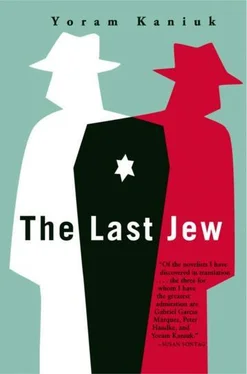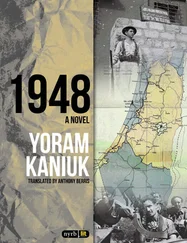He wriggled and waited. I waited too. Menahem's mother sat and looked at me contemptuously. Death blended me with Menahem, through Boaz. In fact, after I loved Boaz, I could return to loving Menahem. Boaz, who didn't know I had stopped loving Menahem even before his death, tried to put a hand on me and then changed his mind and didn't. I waited. I didn't say a word but I wanted to. They always think they defeat me, both Menahem and Boaz, while I, I chose the two of them by myself. Boaz decided he had in fact killed Menahem because he saw a picture of me with Menahem, he loved me and came to take me away from him. He described to me how he killed Menahem to get me and I tried to pretend I believed. He was attached to me even though he tried to live without love. But he wanted Menahem's mother to forgive him for being alive instead of Menahem. And Boaz went on building a stage set for the dead. As a judge you must know: He didn't kill Menahem, Menahem died long before that, but… I told him, come on, let's start a new life. He fled but he didn't want to. There were meetings with army officers, parents, engineers, writers, poets, sculptors, planners, lighting experts, printers, I served coffee, tea, peanuts, wine, I was there, I saw him weeping as he sat and wrote fictional love letters, it was a humiliating spectacle. I told him: You're reducing them; what kind of victory is it that nobody will remember? And the apartment grew.
And everything was full of fabricated death.
I'm writing to you because I want you to know that no matter how reasoned your judgment was, it approves, as I do with my life, a serious act that may in truth not be judged. Like many people I know, and you too, without any premeditation, Boaz turned the nightmare into a celebration and then into a profession. But to the same extent, you can say a prison warden deserves punishment because he keeps under lock and key a person whose nature is to be free, or that you yourself sentence people to severe punishments when the natural law is that life precedes everything, you judge the person by the laws of society, not the laws of nature or life. I understand those considerations, I accept them, but because of those very reasons I must protest, at least to you, because you judged in favor of a man I love, and so you were the only person to whom I can address these words. I go to the Ministry of Defense and see thousands of notebooks. I peep. Oblivion is a medicine that, like life, is intended to circumvent death.
I thought then in court that maybe you would condemn something rooted so deeply here, so awful, but you made a judgment and a judgment didn't make you, you didn't indicate the root of the problem, I wasn't disappointed, I understood, I have no complaints. I attach a letter I wrote to the Levinsky Teachers' College on the night I got drunk for the first time in my life and Boaz raped me when I would have defended myself with a broken bottle in my hand and I didn't hit him.
Yours, Noga Levin
To the Administration of the Levinsky Teachers' College, Tel Aviv
Dear Sirs:
I was very interested in your announcement in the newspaper. You ask the students who attended the Teachers' Col lege who lost their husbands (or) their fiances (your word!) to send one page with the events of our life for the anniversary of the Teachers' College, and here is mine-
My name is Noga Levin. I finished school in nineteen fortyseven. My parents died two years before I was born in a small town near the Zxanten Gulf in southern China. We were the only Jews on the street. All my husbands died of the cancer of war. The last one was in his death throes on the way to the cemetery, but it wasn't possible to change the custom, and in the middle of the funeral, he died. If you're preparing a class reunion, please do not include me among the bereaved girls. Death terrifies me. I live with a man who refuses to marry me, because he loves me. All my love affairs were with dead men. Now that I live with a hangman, I weave a new rope for him. He kills my husbands and every time he succeeds, he brings me a black flower. So, it's not true that there are no black flowers-they should be grown in beds for memorial days and days of mourning and that could even have been a branch of export. On memorial days I sing sad English songs. I know somebody who sold a hundred thousand armored cars for days of mourning. With the money he got from the armored cars, he bought me a white dress and real pearls. Please take me off the list of volunteers for teaching widowhood, bereavement, orphanhood, and commemoration. I intend to live in Denmark with a dog close by and a thin man who smokes a pipe and works in a bank close to home and goes to work on a bicycle. I live with a man who lends his acts of heroism to all kinds of dead people. I think he's teaching me something I don't want to learn even when I was a student the Teachers' College. The main thing you didn't teach me. You taught me to live with death, you didn't teach me to live with life. And that's now a national phenomenon. Now I'm drunk and I feel how much I lack something called a hunger for life.
Respectfully, Noga Levin
Judge, the letter was returned to me, the director came to visit me. He found a cold, silent, and apparently handsome woman. That's what he said. I told him somebody wrote the letter in my name. After he left, Boaz Schneerson filed that letter under "trivialities." You do know the file "trivialities," the one that isn't taxable.
Yours, Noga Levin
I want, said Noga, for somebody to finish me off and Boaz. To destroy the devil in him that lives in me. To release us from the dependence on ourselves and on death. But the years pass. I'm here. I learned, Noga thought of driving a jeep, they collect parts of burned tanks and rotten berets, etc., etc., etc….
Tape / -
I got off the plane shrouded in foreignness. Ebenezer Schneerson got off the plane shrouded in foreignness. Around him was a state he didn't know. When he got into the bus from the plane to the air terminal with Fanya R., he tried to think, but he couldn't. he only said: When we come to Israel, there will be Israeli buses at the airport and Hebrew police. And Fanya R. said: Ebenezer, we've already come.
The clerk stamped his papers, the suitcases came on the baggage carousel, and he stood outside, facing the yelling cabdrivers, Fanya R. leaning on him and he looked at the turmoil.
They took a cab to the settlement. The driver was listening to a radio program and Ebenezer looked at the landscape he thought he was imagining. When they passed the tombstone of the paratroopers, Ebenezer asked to stop. He asked: Where is Marar? The driver turned his head, looked at the strange couple in amazement, stopped at the barrier of prickly pear that still remained here on the border of the citrus grove, and said, What? Marar? What Marar?
The village that was here, said Ebenezer.
Don't know, said the driver, that's the tombstone of paratroopers.
There was Marar here, said Ebenezer.
There was also Sodom and Gomorrah, said the driver, but the tourists don't find them and come to Tel Aviv, which is almost the same thing, and he laughed. He was smoking a pungent cigarette. Ebenezer looked for the houses sliding down the slope, like dovecotes, and didn't find them. Maybe there was no village, he thought, maybe there will be, I don't know, what do I know, maybe that's part of the things that are going to happen like my trip to Israel that is still to come. Something in him bothered him; there was Marar, there was Dana, they weren't, and a dull ticking of old lust stirred in him.
On the main street, nobody knew him. He was dragging a suitcase and Fanya R. walked behind him. They went down the slope, they passed by what had once been the threshing floor, saw new houses and handsome gardens, and an old DeSoto with a woman who looked like a scarecrow, wearing a wide-brimmed hat smoking a long thin cigar, and they came to Rebecca's house. He didn't recognize the house, but the sight of the aging Argentinean officer watering the garden, wearing a military cap, gave him a dull sense of belonging. Shaking with a sudden anger that gripped him, he grabbed Fanya R.'s hand and with his other hand, he pounded on the door. The door was hidden in a thicket of gigantic bougainvillea. The great-grandson of Ahbed opened the door, looked suspiciously at the Last Jew and the woman. The Last Jew said: We came to visit Mrs. Schneerson. The great-grandson of Ahbed said what he had been taught to say: She's not home and come back in a month and then you'll go again, and he tried to lock the door, but Ebenezer put a foot on the threshold and stopped the door. He said: You must be the grandson of Ahbed. The great-grandson of Ahbed didn't move a muscle, and said: I'm the great-grandson of Ahbed, and remove your foot, sir.
Читать дальше












